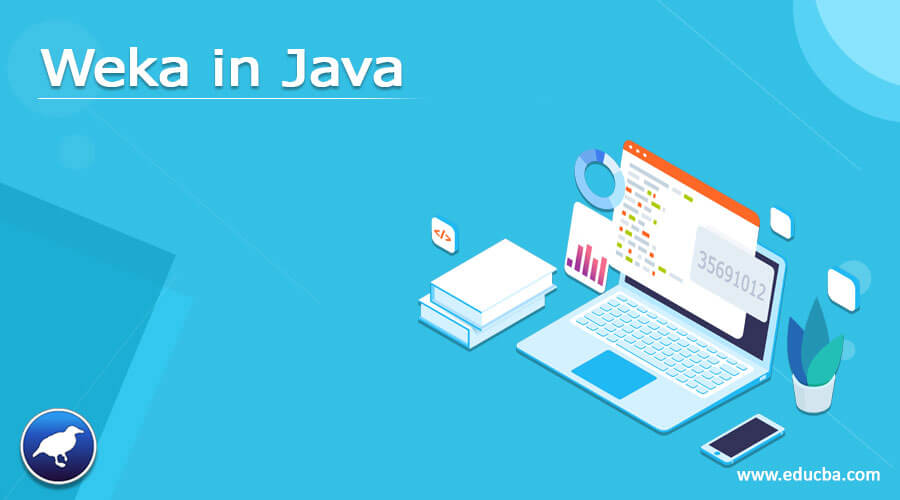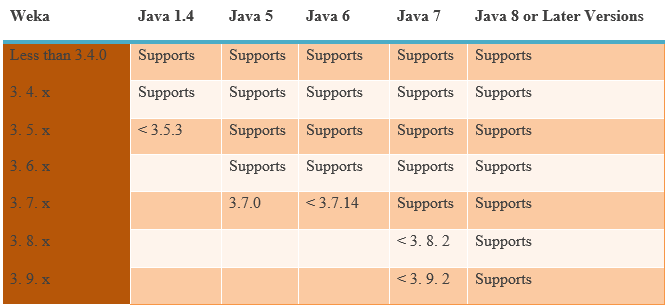Updated April 15, 2023
Introduction to Weka in Java
Weka is abbreviated as Waikato Environment for Knowledge Analysis and it is also the name of a bird in New Zealand called Weka. Weka is an Open Source library for Machine-Learning. It is a Java-based version; it is one of the no-code tools which are resourceful and powerful. Weka in beginning developed and started in the year of 1997 and now it is used in various application areas, mainly it is used for educational intention and do researches. Essentially it can be used to implement the art of Machine Learning models which supports various file formats.
What is weka java?
Weka is a group of Machine Learning algorithms for developing data mining tasks. It encloses tools for Clustering, Data Preparation, Regression, Classification, Visualization, and Association rule mining. Weka is a collected group of algorithms of Machine Learning for the Data Mining tasks. Those algorithms will be applied to the Dataset directly otherwise from the Java-Code.
In the earlier version, Weka was first and foremost designed as the tool to analyze the data from agricultural domains, but now it is a fully Java-based version (Weka 3), recently it is used for various application areas, specifically for the educational purpose and research-oriented.
How to use weka java?
By using Weka, we need to install weka based on your Operating System. Once downloading the archive to extract it you will get the jar file like weka.jar. It contains the entire class files required to developing an application like weka API and so on.
After the complete installation part, we need to include the jar as a classpath in our implementation. The classpath describes that the JDK regards the external class files in external libraries. While adding the classpath it is suggested to use – cp option of commands in JDK. When we work on any of the frameworks then the classpath can be included for the relevant manifest file.
Type of platform
Weka is an Open Source library for Machine-Learning technology. It is a Java-based version; it is one of the no-code tools which are resourceful and powerful. The precondition is that we need to have Java 8.0 installed in your machine. We can install Weka on any kind of platform by following such instructions as follows, after the completion of weka installation you need to include standard interfaces and data processing techniques. Let’s see the following techniques,
- Data Pre-Processing: Once loading the dataset, the Weka makes it possible to rapidly investigate its instances and attributes. In addition, there are various filtering techniques are available, let’s see one example – to convert the data into a numerical way to perform the feature selection to reduce the dimension in the dataset, like to speed up the timings and performance of training.
- Regression Algorithms and Classification: In the classification and regression algorithms there are a set of various algorithms like Decision Trees, Gaussian Naive Bayes, K-Nearest Neighbour, Linear Regression Variants, and Ensembles Techniques.
- Clustering: The Clustering technique is used in organizing to identify the essential categories of our data in an invalid way. Most of the examples algorithms make available with the weka collection are the K-Means Clustering and Expectation Maximisation.
- Data Visualisation: The data visualization technique is an integrated data visualization which promptly predicts the correlations between the represented machine learning patterns and features like K-Means Clustering and Decision Trees.
- Discovering Associations: The discovery association which discovers the basic rules in the dataset, in order to get easier identifiable patterns and also the connections involving various features.
Requirements for weka java
The basic requirement for weka java is that we have in any case Java 1.7 installed. To download and install the weka choose the latest version of weka for your system, it requires at least Java 1.7.
Let’s see the following which shows the minimum version of Java required to execute the particular version of Weka. The up-to-date releases of Weka need Java 8 or later. In order to avoid the improper scaling of Weka’s GUI (Graphical User Interfaces) in your Windows system, you have to make use of Java 9 pr later versions for the display with High Pixel Density (HiDPI).
Advantages
The advantages of Weka consist of the following things,
- We can at free availability under the GNU General Public License
- It’s easy to use because of its GUI (Graphical User Interface).
- It is portable because of the full implementation in Java Programming Language and it’s executed on any of the Modern Computing Platform.
- There is a wide-ranging of collected Data Pre-Processing and Modelling Techniques.
Model generator class in the example
Let’s see the model generator class, to generating a model we need to use Multi-Layer Perception called Neural Networks to categorize in iris 2D dataset. We can make use of the default value of the Neural Network Learning Process or we can set it manually through the setter methods.
There are several Model Generator Class, Lets see the following models as follows,
Conclusion
In this article we have come to known about the Weka, it is an influential tool. In recent times it is used for various application areas, specifically for educational purposes and research-oriented. Hope the article helps you to understand the base things in Weka.
Recommended Articles
This is a guide to Weka in Java. Here we discuss the Introduction, how to use weka java, the type of platform, and advantages with examples.You may also have a look at the following articles to learn more –




